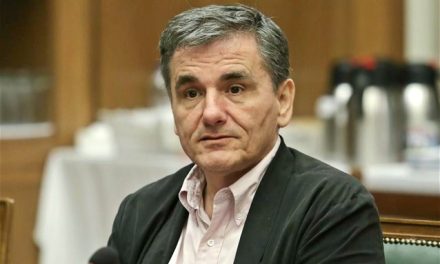In an interview with Avgi daily newspaper (30.1.2017) Dimitri Papadimiriou, Minister of Economy and Development refers to the actions undertaken by the Greek Government for the amelioration of the Greeks’ standard of living, the efforts to attract investments and the results of his visit to the USA in December in the context of his keynote speech at the 18th Annual Capital Link Invest in Greece Forum last December. He also stresses that the effort to support labour and the struggle against unemployment and the issue of the EU Banking Union are important and interrelated challenges for the European Union.
There have been some comments about the probability of Grexit. What is your comment?
This scenario exists only as a theoretical possibility, in the same way that it is possible for the Eurozone to dissolve. But it will never be carried out by this government, because it is not part of their plans or intentions. The government is committed to the positive outcome, i.e. the implementation of the programme and the conclusion of the second evaluation in the best possible way, as well as Greece’s participation in the ECB’s quantitative easing programme.
Despite the signs of recovery for the Greek economy that indicators show and the positive forecasts for 2017, this is not apparent in the everyday lives of citizens. When, do you think this will happen?
Investments take time to reach maturity. We are currently trying to attract investments into the country, to protect the weaker social strata by reallocating of financial burdens and put a permanent end to the decline of the living standards of all Greeks. If we do not create a fiscal space, we will not be able to lighten the tax burden and save resources to support the health system and modernize public transportation.
That is why we try to achieve added results in our negotiation by reducing primary surpluses and readjusting debt. That would reduce state and business lending rates, it would increase liquidity from the ECB, bring new resources from the European institutions (EBRD, EIB, etc.) and retrieve business confidence, which, combined with critical reforms (in public administration, the judicial system, settlement of liabilities, the tax system, licensing, etc.) is necessary to attract investment and create jobs.
The government works on the reconstruction of the welfare state, focusing on citizens’ access to local structures and new or reorganized services which aim to meet basic requirements, in a number of critical areas such as health, labour, social security, social solidarity etc.
You have underlined that, during your visit to the USA, there was a positive mood from the part of investment funds. Can you estimate when this interest will translate into concrete investments?
My sense is that the climate is already changing. The comparative advantages of Greece’s geostrategic position, natural environment, highly qualified personnel, combined with political stability despite the economic crisis, render Greece a particularly attractive destination for foreign investors. This is enhanced by the facilitations offered by the new development law for establishing a company in Greece, as well as the programme for issuing residence permits to third-country nationals and their families who buy real estate in Greece worth over 250,000 Euros.
As far as my recent trip to the US is concerned, there was a lot of interest expressed, not only by expatriates but also by American businesses. US Ambassador Geoffrey R. Pyatt, with whom I am in close contact, has decisively contributed in our efforts.
What challenges lie ahead for the European Union?
Europe needs to face the absence of investments and low growth rates that reduce labour income and sustain high unemployment resulting in centrifugal nationalist tendencies and political turbulence. This practically means a looser fiscal policy and new euro architecture for the Eurozone with a larger budget.
The effort to support labour and the struggle in particular against long-term youth unemployment are important and interrelated challenges for the European Union.
Given the accumulated total debts, the (EU) Banking Union is an additional challenge. By using common tools, however, we can bring labour and growth back to the focus of European unification by absorbing the tremors that austerity and Brexit have provoked to the European project.
What do you think about the new US policy and how do you think it will affect the global economy and, as a result, Greece?
By abandoning TTP, the new US president basically put an end to the multinational trade agreements era that marked the global economy for decades. And regardless of whether he will succeed or not to strengthen the US economy, he clearly forces global economy towards protectionism. Even if a trade war is prevented, it is certain that it will be detrimental to global trade and weaken economic growth rates worldwide, in the EU and in Greece, as historical experience from the Interwar period and a recent OECD research have shown.













